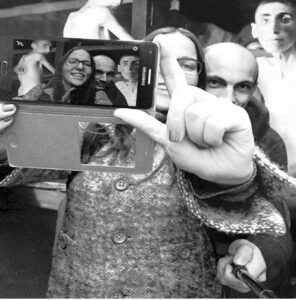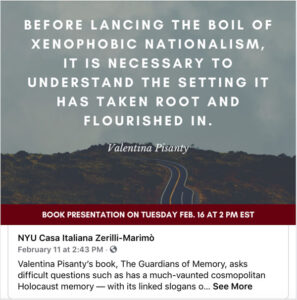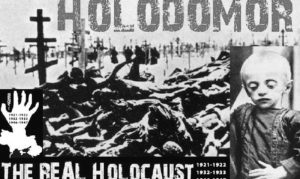The Guardians of Memory and the Return of the Xenophobic Right
By Valentina Pisanty
Translated by Alaistar McEwan with a preface by Michael Rothberg
Valentina Pisanty’s The Guardians of Memory opens with a paradox and a question. The paradox derives from an empirical observation: that the very post-Cold War era that has constructed a widespread commemorative culture dedicated to the Holocaust has also been a period in which politics has experienced a rightward turn characterized by ever more virulent racism and racist violence. The question Pisanty poses involves interpreting this paradox: is this conjunction of a memory culture that understands itself as dedicated to tolerance and antiracism and a political culture that is trending racist merely a coincidence or is there a deeper causal connection to be found? Has a much-vaunted cosmopolitan Holocaust memory — with its linked slogans of “Never forget!” and “Never again!” — simply failed to prevent the rise of the right or, more darkly, might it even be implicated in that political turn?
From the preface by Michael Rothberg.
Author
A scholar of negationism and racism, Valentina Pisanty is Professor of Semiotics at University of Bergamo. Previously the editorial coordinator of Accepting Diversity, an interactive manual on tolerance, which resulted from a project on Umberto Eco, Furio Colombo and Jacques Le Goff, she has written essays on interpretive semiotics, narratology, political speech, rhetoric of racism, Holocaust denial, and memory. Her books include: Leggere la fiaba (1993), Semiotica e interpretazione with Roberto Pellerey (2004), La difesa della razza (2006), L’irritante questione delle camere a gas (1998, expanded edition 2014), all published by Bompiani.

Author : Valentina Pisanty
Translator: Alaistar McEwan
Title : The Guardians of Memory and the Return of the Xenophobic Right
Year : 2021
Series : Ideas
Paperback – ISBN 978-1-941046-32-6
Ebook – ISBN 978-1-941046-33-3
Price ebook: $9
Price paperback: $15
Publication date: January 10th, 2021.
In the concise chapters of this extended essay, Pisanty tracks the weaknesses of the dominant memory culture across a series of domains of public culture. She takes aim at the sacralization and fetishization of witness testimony, the rigid structures of collective memory, the banality of “Holocaust tourism,” the stereotypical formats of popular film, and the punitive legal culture of memory laws. One of the most salient features of that paradigm is its structuring opposition between victims and perpetrators, which Pisanty calls the “familiar schema persecuted vs. persecutor.” Michael Rothberg










